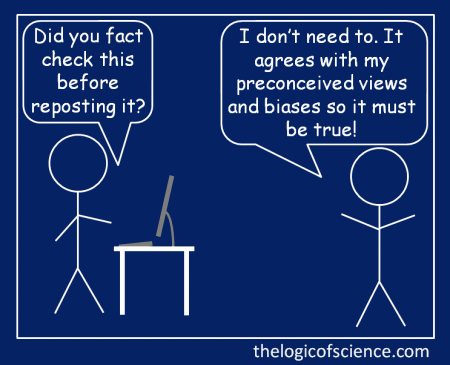Evaluating All Information
Evaluating information doesn't end when you finish your research paper! To be a well informed citizen it is important to be thoughtful and think critically about all of the information you consume. The tools on this page will help you to think about how you get your news.
Question Your Sources
What is the Web Domain?
Strange URLs: If the web domain looks odd, the content is likely to be just as questionable. Look out for URLs ending in “.com.co,” which are fake versions of real news sites (abc.com.co). Question websites with names ending in “lo” which mix real and fake information (for example, newslo.com).
Blogs: Often Wordpress sites and sites with “blog” in the URL indicate personal blogs.
Who is Responsible for the Content?
“About Us” Page: Verify information a site provides on its “About Us” page. See if it has been identified by sources that look for fake news (such as snopes.com). A news source lacking information about its credentials is also suspicious.
Author and Editor: An article without an author byline might be suspicious. Additionally, ask: Is this an article that has made it past an editor’s desk? Reputable news sites sometimes have blog sections that do not receive the same oversight as news articles.
Does it Look like a Reputable News Source?
Style: If the site tends to have headlines with ALL CAPS and !!!, it is probably not legitimate. Obviously poor web design also can be a red flag.
Writing: Stories written in a hyperbolic, emotional style likely are not legitimate. In addition, typos and other errors indicate a lack of editorial oversight.
What do Other Sources Say?
Other Reporting: Look for other reporting on the story. If no other sites are reporting on it, the source might be suspect.
Cited Sources: Follow up on sources cited in the article to see if they have been accurately represented. For instance, has a quote been taken out of context?
How did You Find the Source?
Clickbait: Be wary of sources with titles designed to shock and generate shares.
Search Terms: When searching for news on a topic, consider whether or not your search terms belie your own biases.
Escape Your Filter Bubble
Acknowledge Confirmation Bias
Confirmation Bias: "The tendency to interpret new evidence as confirmation of one's existing beliefs or theories."
Confirmation Bias Graphic

Other Useful Resources
-
snopes.comA fact-checking service dedicated to investigating and reporting on online "urban legends" and rumors, active since 1995.
-
politifact.comA politics fact-checking site run by editors and reporters at The Tampa Bay Times.
-
factcheck.orgAn organization that performs fact-checking of statements made by "major U.S. political players." It is a project of the Annenberg School for Communication at the University of Pennsylvania.
-
The Ultimate Cheat Sheet for Critical ThinkingCreated by The Global Digital Citizen Foundation, a "non-profit organization dedicated to cultivating responsible, ethical, global citizens for a digital world."
Sources
Question your Sources Primarily Adapted from:
Zimdars, M. (2016). False, misleading, clickbait-y, and/or satirical “news” sources. Retrieved from: https://docs.google.com/document/d/10eA5-mCZLSS4MQY5QGb5ewC3VAL6pLkT53V_81ZyitM/preview
Other Sources Consulted:
Meriam Library California State University, Chico. (2010). Evaluating information- Applying the CRAAP test. Retrieved from: http://www.csuchico.edu/lins/handouts/eval_websites.pdf
Valenza, J. (2016, November 26). Truth, truthiness, triangulation: A news literacy toolkit for a “post-truth” world. School Library Journal. Retrieved from: http://blogs.slj.com/neverendingsearch/2016/11/26/truth-truthiness-triangulation-and-the-librarian-way-a-news-literacy-toolkit-for-a-post-truth-world/
